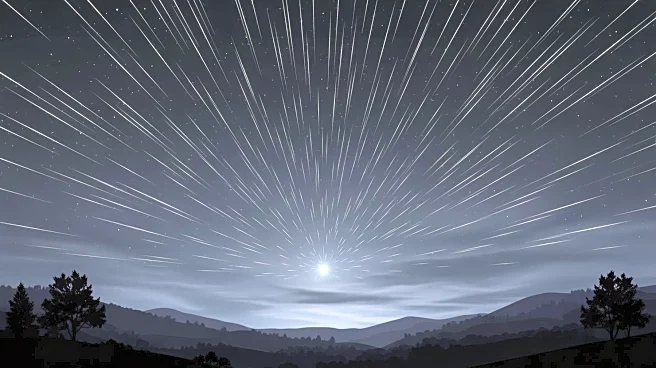What's Happening?
The annual Leonids Meteor Shower is set to provide a spectacular display in mid-November, with the peak viewing times on the nights of November 16th and 17th. This meteor shower, which is active from November 3rd to December 2nd, is known for its bright
meteors that appear to emanate from the constellation Leo. The Leonids are among the fastest meteors, traveling at speeds of up to 44 miles per second, and are famous for their fireballs and earth-grazers. Historically, the Leonids have produced meteor storms, such as the one in 1966 when thousands of meteors were visible every minute for a brief period. Although such storms occur approximately every 33 years, this year's event is expected to be a modest yet beautiful spectacle. NASA advises viewers to find a dark location away from city lights and to prepare for cold weather by bringing warm clothing, a blanket, or a chair.
Why It's Important?
Meteor showers like the Leonids offer not only a visual treat but also scientific opportunities. Researchers study these meteors to understand potential threats from space, such as air explosions or collisions with Earth. The Leonids, with their fast speeds and bright displays, can provide valuable data for scientists monitoring space debris and other celestial phenomena. For the public, the event is a chance to engage with astronomy and appreciate the natural wonders of the night sky. It also serves as a reminder of the vastness and beauty of the universe, fostering interest in space exploration and science.
What's Next?
As the peak of the Leonids approaches, sky-watchers are encouraged to plan their viewing sessions. NASA recommends lying down with feet facing east to maximize sky visibility. The meteor shower continues until dawn, allowing ample time to observe the meteors. Patience is key, as the eyes need about 30 minutes to adjust to the darkness for optimal viewing. This event may also spark discussions among scientists and enthusiasts about future meteor showers and their potential impacts on Earth.
Beyond the Headlines
The Leonids Meteor Shower highlights the cultural and educational significance of astronomy. Events like these can inspire educational programs and public interest in science, encouraging people to learn more about space and the universe. Additionally, the meteor shower can serve as a peaceful communal experience, bringing people together to share in the wonder of the night sky.
















